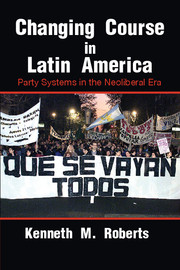Book contents
- Frontmatter
- Dedication
- Epigraph
- Contents
- List of Figures
- List of Tables
- Preface and Acknowledgments
- List of Abbreviations
- 1 Introduction: Party System Change in the Neoliberal Era
- Part I Explaining Regional Patterns
- Part II National Experiencesin Comparative Perspective
- 7 Critical Junctures in Elitist Party Systems
- 8 Critical Junctures in Labor-Mobilizing Party Systems
- 9 Aftermath: Reactive Sequences and Institutional Legacies
- 10 Conclusion: Political Legacies and the Crisis of Representation
- Appendix Election Results in Latin America
- References
- Index
8 - Critical Junctures in Labor-Mobilizing Party Systems
Published online by Cambridge University Press: 18 December 2014
- Frontmatter
- Dedication
- Epigraph
- Contents
- List of Figures
- List of Tables
- Preface and Acknowledgments
- List of Abbreviations
- 1 Introduction: Party System Change in the Neoliberal Era
- Part I Explaining Regional Patterns
- Part II National Experiencesin Comparative Perspective
- 7 Critical Junctures in Elitist Party Systems
- 8 Critical Junctures in Labor-Mobilizing Party Systems
- 9 Aftermath: Reactive Sequences and Institutional Legacies
- 10 Conclusion: Political Legacies and the Crisis of Representation
- Appendix Election Results in Latin America
- References
- Index
Summary
In contrast to elitist party systems, LM systems were partially or wholly reconfigured by labor mobilization and the rise of mass politics in the middle of the 20th century. Deeply embedded in the state-centric logic of ISI, these party systems encountered fierce distributive conflicts and highly disruptive political upheavals as the ISI model entered into demise in the 1970s and 1980s. At a minimum, all of the LM party systems experienced major electoral realignments during the transition to neoliberalism; none, in other words, rode out the critical juncture with the type of party system continuity and adaptation seen in the Honduran and Costa Rican cases in Chapter 7. Most LM party systems, in fact, witnessed the rise of major new partisan contenders, while two of them – Peru and Venezuela – experienced party system decomposition.
Nevertheless, some LM party systems were realigned or reconfigured during the critical juncture in ways that were conducive to institutional stability in the aftermath period, whereas others were prone to destabilizing reactive sequences and ongoing institutional change. This chapter attempts to explain such variation through a comparative analysis of four LM cases: Argentina, Brazil, Chile, and Venezuela. The cases were selected to offer a wide range of variation on the key outcomes of interest – namely, the stability of party systems and their patterns of change over time, both during the critical juncture and in the aftermath period. The set of cases thus includes the most electorally stable LM party system (Chile), as well as a case where the party system decomposed by the end of the critical juncture (Venezuela). These cases also vary on a number of potential explanatory variables of interest, including the level of institutionalization of antecedent party systems, the gravity of economic crises during the critical juncture (in particular, the existence of hyperinflationary crises), and the political identity of leading market reformers and their opponents.
- Type
- Chapter
- Information
- Changing Course in Latin AmericaParty Systems in the Neoliberal Era, pp. 174 - 228Publisher: Cambridge University PressPrint publication year: 2015

